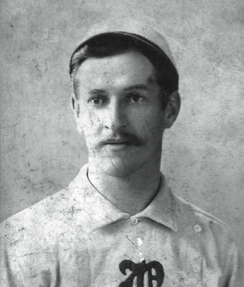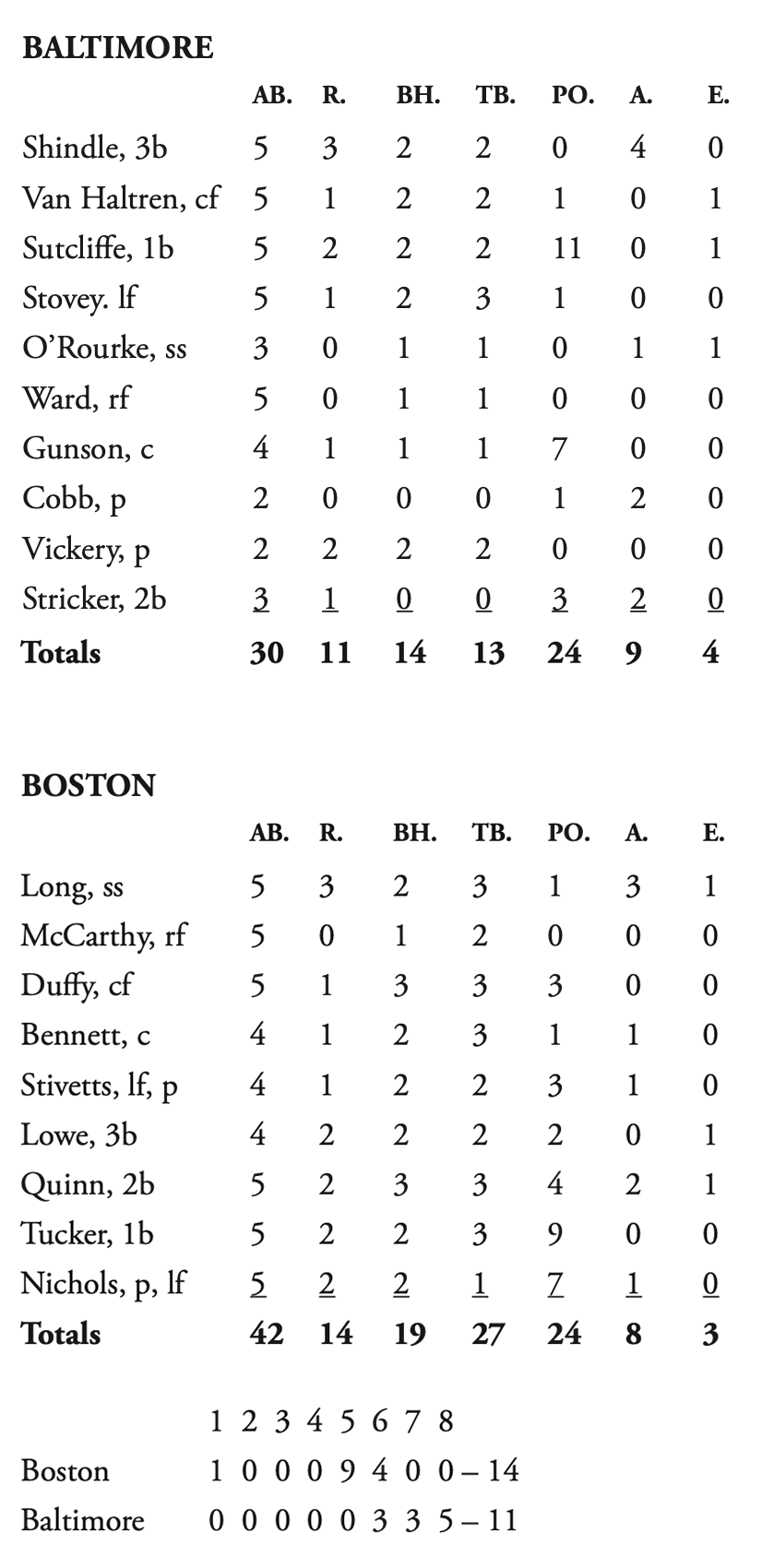September 19, 1892: Kid Nichols’ batting fest

After the collapse of the American Association at the conclusion of the 1891 season, the National League absorbed four clubs and swelled to 12 teams. It was decided at the annual meeting in New York in November of 1891 that the 1892 season would be divided into two halves with the winner of the first half playing the winner of the second, if two different clubs filled those positions, to determine a champion.
Although Boston (52-22-1) finished in first place at the conclusion of the first half of the season, 2½ games in front of Brooklyn, the Beaneaters limped into Baltimore in late September for the start of a five-game road trip. The Orioles were simply an awful club. They would finish the season 46-101, last out of 12. At the end of the first half they were 20-55, 32½ games behind the Bostons.
Nursing a 33-21-1 second-half record, the Beaneaters were experiencing some internal conflict. Billy Nash, the team captain and third baseman, failed or refused, depending on the source, to make the five-game road trip due to a “sick relative.”1 More likely, Nash was perturbed about relinquishing the captaincy to legend Mike “King” Kelly. Kelly caused trouble the entire season, which was not unusual for him. From 1889 to 1891, Kelly suited up for five teams in three leagues. He was not the star player he once was. His batting showed the effects of a superstar who once was, and his fielding was almost nonexistent due to his frequent time on the bench. His deficiencies were certainly the result of his drinking and carousing. Kelly caused further ill feelings when he openly predicted that Brooklyn, which finished just behind Boston at the conclusion of the first half, would be the second-half season champion.2 Kelly proved that his oddsmaking were as good as his play, with Brooklyn finishing third in the second half.
Nash spent seven of his eight seasons in Boston, including the 1890 season with the city’s entry in the Players’ League. He had developed into one of the game’s best third basemen. Four Boston players, all captains at one time on other teams, had thrown their support for Nash early in the season.3 Nash resigned as captain and manager Frank Selee promoted Kelly to the role, hoping that it would quell his disruptive presence.4 This theory is in line with allowing a convicted bank robber uninhibited access to the vault at the community bank.
From the start of the season, Kelly claimed that his contract stipulated that he was to be the team captain.5 In 1891 Kelly played in 16 games for the Bostons of the National League (NL) and four for the Bostons of the American Association (AA), both top finishers in their league. Kelly played in 78 games for the Beaneaters in 1892; however, he was ineffective, hitting .189 as the team’s only regular to hit less than .200.
On September 19 at Baltimore, Selee was forced to put starting pitcher Jack Stivetts in left field and assign left fielder Bobby Lowe in to fill Nash’s position at third base.6 (Although Stivetts was part of the three-man Boston rotation, he was a regular substitute in the outfield.)
Slated to start the road trip opener was Boston’s budding star, 22-year-old Charles “Kid” Nichols. He had joined the Beaneaters in 1890. He won 27 and then 30 games in his first two seasons. Nichols would amass a career-high 35 wins in 1892 and on this day the switch-hitter would have a very productive day as a batter.
In front of 804 spectators at Union Park in Baltimore, Boston took a 1-0 lead after the first inning against starter George Cobb. Nichols held Baltimore scoreless through four innings. In the top of the fifth inning, Boston posted nine runs, eight of them as the result of five singles, two doubles, and a bases-clearing triple by Nichols. In the Baltimore sixth, Cub Stricker ended the inning by smashing a grounder to Nichols, who stopped the ball with his pitching hand. Nichols hopped around the box in pain before throwing to first baseman Tommy Tucker for the final out. An ineffective Cobb was replaced by part-time starter Tom Vickery to begin the sixth inning. Boston proceeded to add four more runs on a grand slam by Nichols to increase its lead to 14 runs and Nichols’ RBI total in the game to seven.
In the sixth Nichols surrendered singles to the first two Baltimore batters. He removed himself from the box and switched positions with left fielder Jack Stivetts. Stivetts was not at his best; he surrendered 11 runs over three innings. Amid Baltimore’s torrid comeback, darkness saved Boston as umpire Billy Lynch called the game after eight innings. The Beaneaters were 14-11 winners.
Boston would finish the second half three games behind first-place Cleveland, setting the stage for a best-of-nine playoff. Boston won the series five games to none, including a tie in Game One with Nichols winning Games Four and Six.
Nichols’ record for RBIs for a pitcher stood for less than a year and was broken by another Beaneaters pitcher, Harry Staley, who plated nine on June 1, 1893.
Earned Runs – Boston, 6; Baltimore, 6. First base on errors – Boston, 3; Baltimore, 3. Bases on errors – Baltimore, 3; Boston, 5. Left on bases – Baltimore, 6; Boston, 7. Two-Base Hits – Long, Bennett, McCarthy, Stovey. Three-Base Hits – Nichols, Stovey. Home-Runs – Nichols. Sacrifice Hits – Quinn, Stricker. Stolen Base – Van Haltren (2). Sacrifice Hits – Stricker, O’Rourke, Quinn. Double play – O’Rourke, Stricker and Sutcliffe; Stivetts and Quinn. First base on balls – By Cobb, Bennett, Stivetts; by Vickery, Lowe; by Nichols, O’Rourke; by Stivetts, O’Rourke, Stricker. Struck out – By Cobb, McCarthy, Bennett, Nichols (2); by Vickery, Nichols; by Nichols, Cobb. Wild pitch – Cobb. Passed ball – Gunson. Time – 2:10. Umpire – Lynch. Attendance – 804.7
Of the four box scores used to create this one, no two were exactly the same. In fact, they were all vastly different, as was frequently the case in the nineteenth century. There was a discrepancy in many categories and some box scores were more detailed than others. The information gathered for this game was, at times, merely educated guesses. It cannot be said with the utmost confidence that that what is compiled is precisely what occurred on September 19, 1892.
Sources
In addition to the sources cited in the Notes, the author also consulted the Baltimore Sun.
Notes
1 Boston Globe, September 20, 1892: 5.
2 Donald Hubbard, The Heavenly Twins of Boston Baseball (Jefferson, North Carolina: McFarland Company Inc., 2008), 93.
3 Hubbard, 91.
4 Hubbard, 93.
5 Hubbard, 91.
6 Boston Globe; September 20, 1892: 5.
7 Box score compiled from New York Times (9/24/1892), Chicago Tribune (9/20/1892), Washington Post (9/20/1892), and Boston Globe(9/20/1892).
Additional Stats
Boston Beaneaters 14
Baltimore Orioles 11
8 innings
Union Park
Baltimore, MD
Corrections? Additions?
If you can help us improve this game story, contact us.


